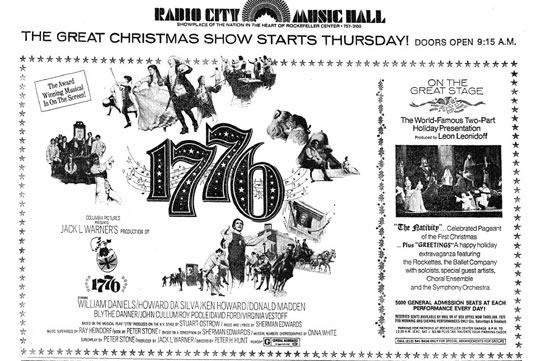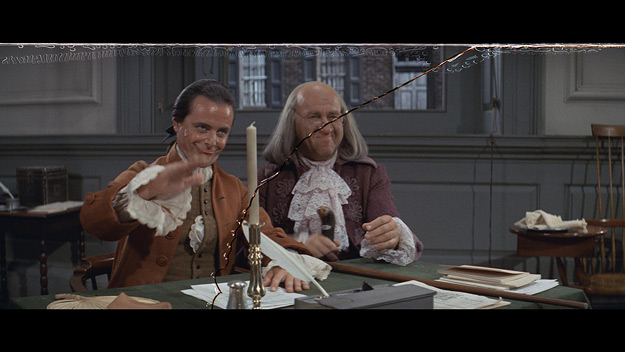With a book by Peter Stone and music and lyrics by Sherman Edwards, 1776 starred William Daniels as John Adams, Howard Da Silva as Benjamin Franklin and Ken Howard as Thomas Jefferson. The film was not a hit on original release, but like so many films, it developed a following in the ensuing years and has been an oft-requested title for Blu-ray and other high-definition platforms.

Originally released in theaters with a running time of 142 minutes, the Blu-ray features two cuts of the film: a 165-minute Director’s Cut and a 168-minute Extended Cut. Also included are some screen tests, deleted and alternate scenes (with commentary), and two audio commentary tracks. The first track, originally recorded for the 2002 DVD release, features Hunt and screenwriter Peter Stone. The other commentary track, new to the Blu-ray Disc, features Hunt and actors William Daniels and Ken Howard.
The world premiere of 1776 was held on November 8th, 1972, in New York at the Ziegfeld Theater. The following day the film premiered in Philadelphia and also opened its exclusive New York engagement at the fabled Radio City Music Hall, where it played a very successful twelve-week run. The subsequent release around the world, however, was met with less success. (In June of 1976, 1776 returned to Radio City for a special, two-week bicentennial celebration engagement.)

The film, like most, received mixed reviews. Some reviews were glowing, but the negative ones were often scathing or downright ridiculous. Vincent Canby of The New York Times, for instance, wrote, “The music is resolutely unmemorable. The lyrics sound as if they’d been written by someone high on root beer, and the book is familiar history—compressed here, stretched there—that has been gagged up and paced to Broadway’s not inspiring standards.”
“The music in 1776 has its own kind of ’American Crude’ flavor, which is part of the charm of the piece,” Hunt explains. “But there are some members of the New York intelligentsia who simply don’t buy it. They think it’s beneath them. Canby perhaps is one of them. I know that Judith Crist was another. She hated the play, and she wanted to get her hands on it but she couldn’t until the movie came out. And then she got even when the movie came out and took it to task, very unfairly in some areas. I think if she had to rethink it today, she would realize that, if anything, we were a little ahead of our time, rather than what she was saying.”
“1776 is an unusual and quite palatable history lesson, appropriate for Fourth of July screenings,” says Matthew Kennedy, author of Roadshow! The Fall of Film Musicals in the 1960s. “The timing of 1776 reflects the dwindling confidence and commitment to the roadshow format and the film musical genre in general. It was produced by Jack L. Warner—yes, that Jack L. Warner—the man behind the roadshow behemoths My Fair Lady and Camelot. 1776, in contrast, was a modestly-budgeted general-release musical that didn’t do very well. It came out after studios lost their shirts on Star!, Sweet Charity, Hello, Dolly!, Darling Lili, and Goodbye, Mr. Chips. Just one month after 1776 appeared, another Broadway adaptation, Man of La Mancha, opened to horrific reviews and piddling box-office. It was the last traditional roadshow release in the United States.”
“We came in a little late,” Hunt admits. “The musical had reached the end of the road.”
In March of this year, the TCM Classic Film Festival premiered a new restoration of 1776 at the Chinese Theater in Los Angeles. “[The festival screening] was terrific,” Hunt enthused. “It played beautifully to a packed house. I was happy to hear every laugh landed, and it seemed more relevant today than it did when we first did it in 1969 on stage.”

The film was restored by Sony Pictures under the supervision of Grover Crisp, the company’s Executive Vice President of Asset Management, Film Restoration & Digital Mastering. “This new work differs [from the previous restoration of 1776] in a number of ways,” Crisp says. “Fifteen years ago all the work was done in a photo-chemical environment and today it is all digital in a 4K environment. We were able to take advantage of the high resolution to maintain the highest image quality throughout the workflow. Also, in the earlier work there were compromises we had to make photo-chemically, creating duplicate picture elements, for instance, when recombining pieces of shots that had been cut or shortened. So, the previous DVD was derived from an HD transfer from an inter-positive element we made from the original camera negative and other elements. We did not have to make those compromises this time and we gained the benefit of a wider dynamic range, better color fidelity, using the original negative directly.”

Despite improvements afforded by working in the digital domain, there still were challenges to the restoration project. “Most of the challenges were in putting the pieces back together in as seamless a manner as possible,” Crisp explains. “We managed to find most of the original negative for the sections that had been cut, but they had been handled and stored differently over the decades than the rest of the cut camera negative. So, there were issues of fading to deal with, especially more challenging when the pieces to be put back together were in the same shot. For many cut scenes there were lost frames, a natural happenstance of the re-editing that took place for the initial release, which results in a minor jump cut here and there. Sheri Eisenberg did a great job at matching color on the really tough sections with the differential fading.”
“The original release of the film was in mono,” Crisp reveals. “We were able to use many of the original stereo recordings, however, beginning with the first restoration, but refined the mix and improved the overall sonic quality for this new release.” The audio on the Blu-ray Disc is DTS-HD Master Audio.
Robert Endres, longtime projectionist at Radio City Music Hall, recalls being surprised the studio sent a mono print considering 1776 was a musical made during an era where magnetic multi-channel prints were de rigueur for musicals. “I always pushed for stereo prints whenever possible,” Endres says. “Upon reflection, though, I could see why the studio didn’t pull a mag print for either run. 1776 is a kind of intimate musical with no large orchestral or choral moments like the 76 Trombones finale of The Music Man.”
“I think the film has grown in stature over the years,” says Sony’s Crisp. There has been a healthy cult following surrounding the film for many years, but with this release and the availability of the film theatrically, I think it will get the wider attention it truly deserves. It has a remarkably literate screenplay by Peter Stone which would likely hold up as a straight drama, but I have always felt 1776 is a really terrific musical.”

“It’s a great story about our country,” Hunt adds. “It humanizes people that you normally see in paintings or read about in history books. They become understandable, and you realize what it took to make this country happen in the first place and what a revolutionary—no pun intended—thing that was.”
And what of the music since, after all, the film is a musical…. “The music is unique and helps lighten the thing and make it less of a history lesson,” Hunt says. “It is an entertainment.”
Special Thanks:
Neil S. Bulk, Chris Chiarella, Grover Crisp, Robert Endres, Peter H. Hunt, Matthew Kennedy, Mark Lensenmayer, Mike Matessino, Ted Wilkinson.
- Michael Coate



